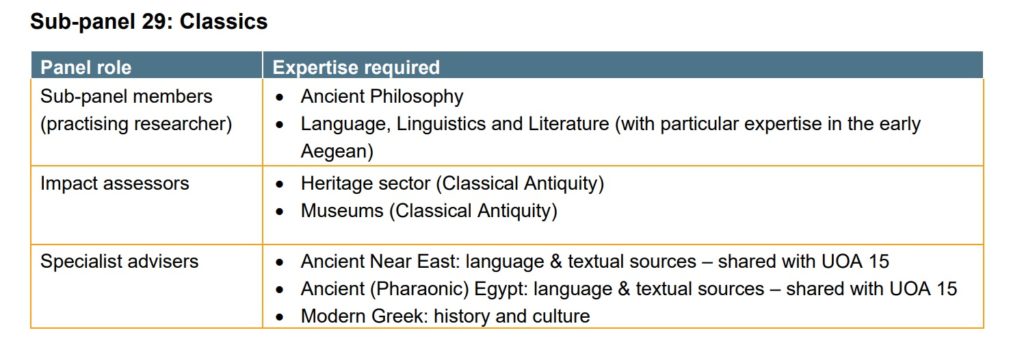Additional nominations to the REF sub-panel by the Women’s Classical Committee UK – new deadline
by lizgloyn
We note that the the Research Excellence Framework 2021 has invited nominating bodies to make further nominations to REF sub-panels, and that a new deadline for making such nominations has now been set. We ask candidates who seek nomination to the REF Classics sub-panel by the Women’s Classical Committee UK to provide answers to the questions below (in brief bullet points) by Friday 31st July 2020, and to send them to the WCC UK’s Administrator, Liz Gloyn, at womensclassicalcommittee at gmail.com. The questions mirror those asked in the HEFCE nomination form, with the addition of Q6 which is specific to the WCC UK.
The sub-panel seek nominations in the following areas:
- Subpanel member (practicing researcher) with expertise in ancient philosophy
- Subpanel member (practicing researcher) with expertise in Language, Linguistics and Literature (with particular expertise in the early Aegean)
- Impact assessor from the heritage sector with a focus on classical antiquity
- Impact assessor from the museums sector with a focus on classical antiquity
- A specialist advisor in the Ancient Near East: language & textual sources
- A specialist advisor in Ancient (Pharaonic) Egypt: language & textual sources –
- A specialist advisor in Modern Greek: history and culture

Candidates may familiarize themselves with the role and duties of sub-panel members, including the workload and provisional timetable, available at https://www.ref.ac.uk/panels/nominating-panel-members/ and https://www.ref.ac.uk/publications/roles-and-recruitment-of-the-expert-panels-ref-201703/. The announcement about the revised REF timetable at https://ref.ac.uk/publications/revised-submission-deadline-and-the-assessment-period-for-impact/ may also be of interest.
We will be making nomination decisions based on the published HEFCE criteria (captured in these questions), with the additional criterion that your nomination should further the WCC UK’s aims (for which see question 6). We will evaluate candidates of all genders according to the same criteria. We note that at present, of the 14 current members of sub-panel 29, 10 are women; we will be taking this gender imbalance and its implications for unequal distribution of the service workload into consideration in our nominations. The WCC UK will avoid nominating from institutions already represented on the sub-panel wherever possible.
Forms will be circulated to our Steering Committee for comment, before a final nomination decision is made by a small sub-committee formed from current SC members. A full list of SC members and liaisons can be found on our website. We do not intend to publish the list of those nominated by WCC UK.
Questions For Nominees
1. Do you have previous REF panel experience? Give details.
2. What modern languages are you able to assess in?
3. Would you have any major conflicts of interest in regard to your current or former employment, substantial collaborations, family and friends, and, financial interests? See Annex D for further details.
4. What are your areas of expertise, including (if applicable) experience in wider use and benefits of research?
5. Outline which specific role you are nominating yourself for and provide evidence in support of your nomination (e.g. key achievements and academic appointments; esteem indicators such as editorial posts; experience of research management, commissioning, using or benefitting from research; experience of leading/managing/practising interdisciplinary research; experience of peer review, research quality standards, or of evaluating impact, benefits, or quality of research).
6. How will your appointment to the sub-panel help to advance WCC UK’s published aims? Our aims are:
- Support women* in classics**
- Promote feminist and gender-informed perspectives in classics
- Raise the profile of the study of women in antiquity and classical reception
- Advance equality and diversity in classics
* By ‘women’ we include all those who self-define as women, including (if they wish) those with complex gender identities which include ‘woman’, and those who experience oppression as women.
** By ‘classics’ we understand the study of the ancient Mediterranean world and its reception, including but not limited to scholarship by students and post-holders in academic departments of Classics, Ancient History and Archaeology.
